
According ArchitectureQuote, the profession of an architect visualizer is in high demand today. It becomes especially popular due to a high interest in 3D rendering. This industry is expected to expand at over 20% CAGR until 2026.
An architect visualizer implements creative ideas, follows plans, as well as creates architectural illustrations and other materials to produce realistic 3D models or animations to visualize buildings.
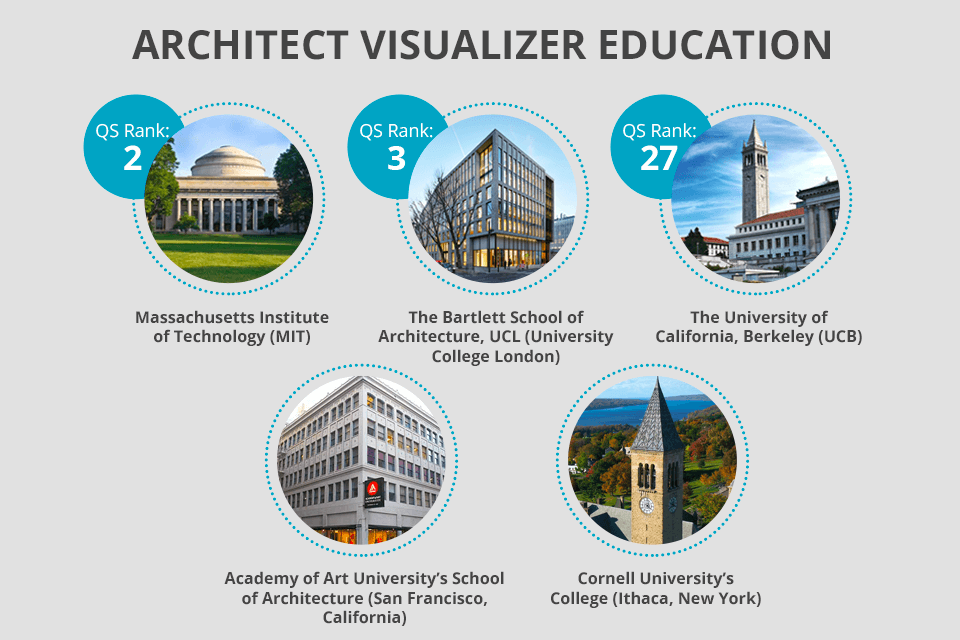
Regardless of your location, it’s highly likely that there is a top-level university, school, or college in your country where you can get a degree that will help you become an architect visualizer.
Popular universities:
Massachusetts Institute of Technology (MIT)
The University of California, Berkeley (UCB)
The Bartlett School of Architecture, UCL (University College London)
Colleges and schools:
School-ing (Spain)
YRGO (Sweden)
Academy of Art University’s School of Architecture (San Francisco, California)
Cornell University’s College of Architecture, Art, and Planning (Ithaca, New York)
These days, you can easily find a tutor teaching a 3D visualization course. Because of this, many newly-trained architectural visualizers don’t even have a background in architecture.
Instead of taking expensive college courses and getting a degree, you can use such platforms as Skillshare and Domestika. They list a variety of courses that will help you master all the skills you might need.

Another way to get the skills necessary for an architect visualizer is to become an apprentice at a construction or architectural rendering company. After completing it and mastering new skills, you can become a professional 3D visualizer.
If you are older than 16, you can easily become an apprentice. It will allow you to get employed and work at least 30 hours per week. You will master new skills when working on different projects. Besides, you will study materials created by a training provider.
When evaluating the level of professionalism of a 3D artist, clients usually analyze a portfolio. Besides, they pay attention to the reviews left by other clients as it will allow them to understand whether they were pleased with the results of cooperation.
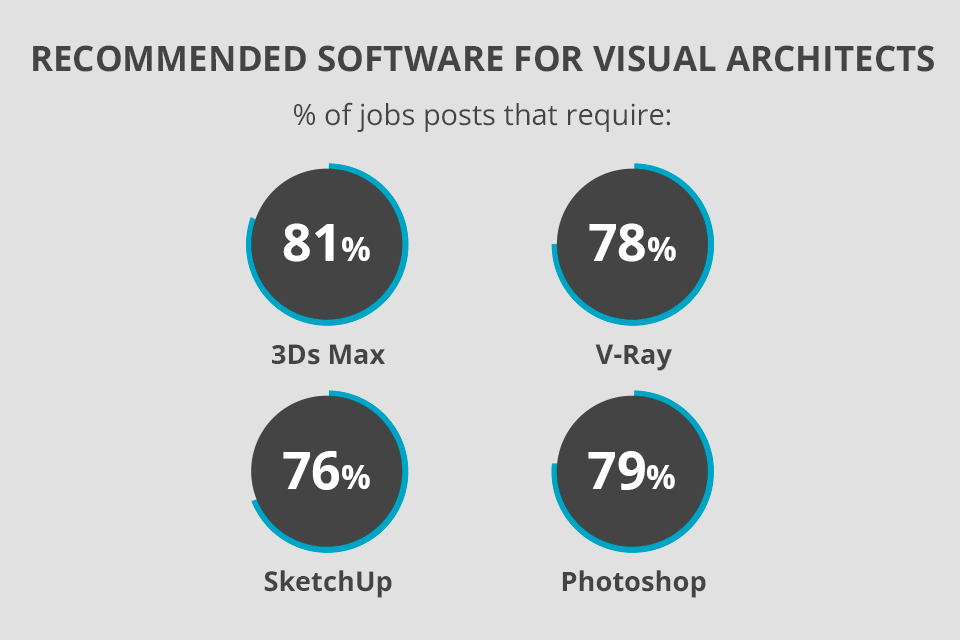
Professional use of specialized software. If you want to become a successful 3D artist, you need to master such rendering software as 3Ds Max, V-Ray or Corona Renderer plugin, Photoshop, and other Adobe software.
Top-level artistic skills. To create attention-grabbing 3D scenes, you need to take into account client requirements and select the most suitable styles. You should have solid knowledge of exterior and interior design as well as learn how to use color theory and image composition, etc.
Advanced visualization techniques. The more you work in the industry, the better you will know these techniques. You will need to master texturing, shading, lighting, and post-production. It will allow you to create realistic CG images with a high level of detail.

Knowledge of architectural drafts. If you want to work as a CG visualizer, you should master CAD software, such as AutoCAD, Revit, and SketchUp. It will allow you to create projects with the right dimensions and proportions.
Every 3D visualizer should know how to read architectural drawings. For this reason, many professionals working in this area have degrees in architecture or design.
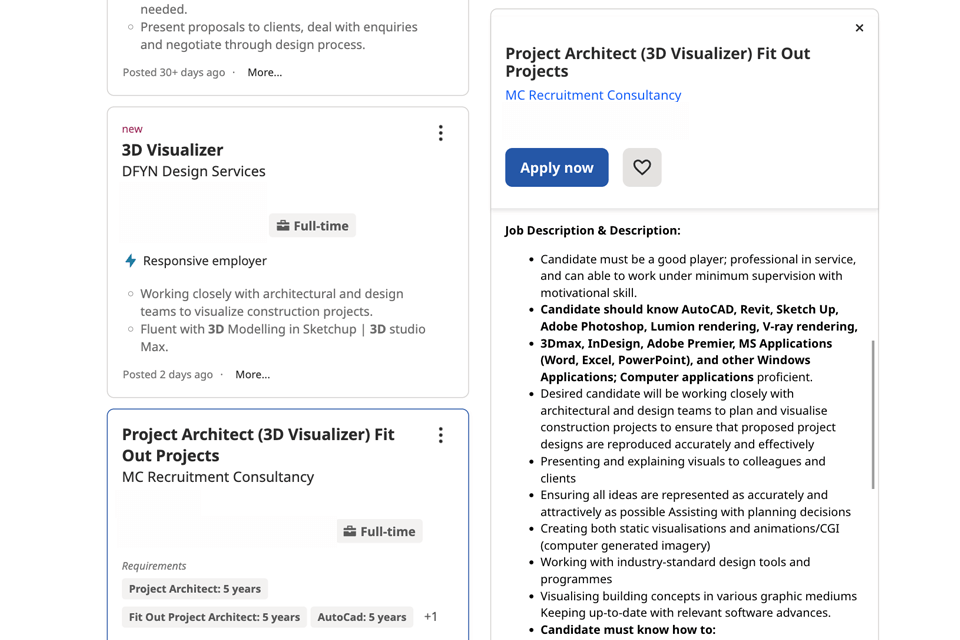
If you are going to work as a 3D architect visualizer, you will need to learn how to create projects together with design and architectural teams. You will have to follow the requirements closely and meet deadlines.
As a 3D visualizer, you will be expected to perform the following tasks:
In case you want to become a 3D architectural visualizer, take a look at the following platforms:
Behance. This web-based platform was created for those who want to share their ideas with others. You can post your projects on it. The site has convenient search tools that allow you to filter the results based on location, creative field, and type of project.
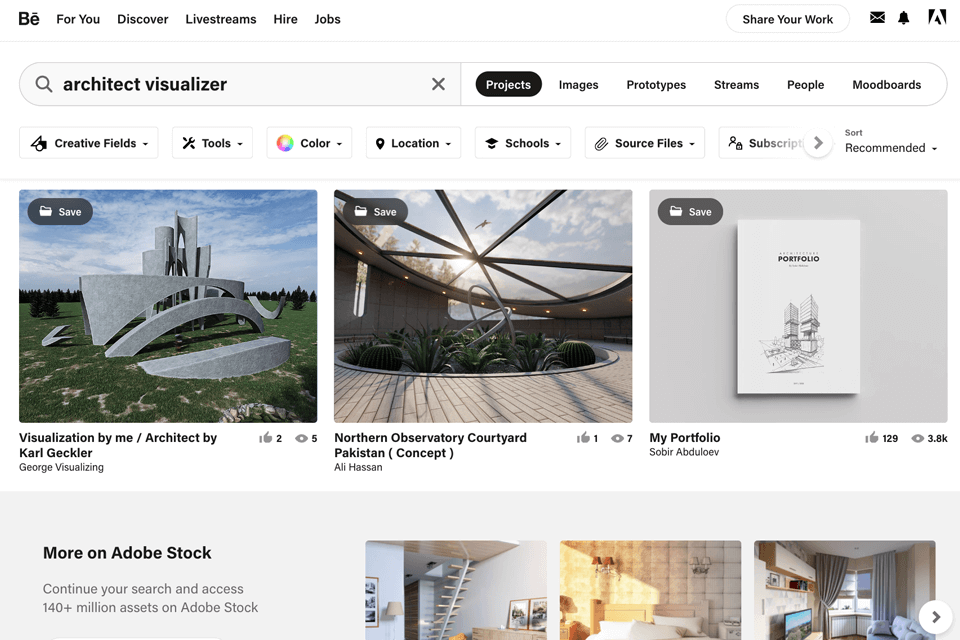
Indeed. This site is suitable for finding jobs in different industries. You just need to indicate what type of job you are looking for, select your location, and use additional filters, such as work format, salary, etc.
Upwork. This platform lists many profiles of 3D digital artists, which makes it easier for users to find information about their work and resumes. Most architectural visualization professionals on this site provide Concept Art, 3D Architectural Rendering, Interior Design, and other services.

Ronen Beckerman’s blog. It was founded as a forum with a blog where a community of professionals interested in creating visualizations would discuss their projects and find efficient solutions. These days, it’s a popular platform for showcasing portfolio projects.
Cg Architect. On this site, you will find an in-built gallery, informative forums, member tabs, and an extensive section with architecture visualization jobs. You need to sign up to be able to send messages.
LinkedIn. This is a widely used social network for specialists from different industries. The creators of this platform added convenient tools that help clients find a professional with a necessary skill set quickly.
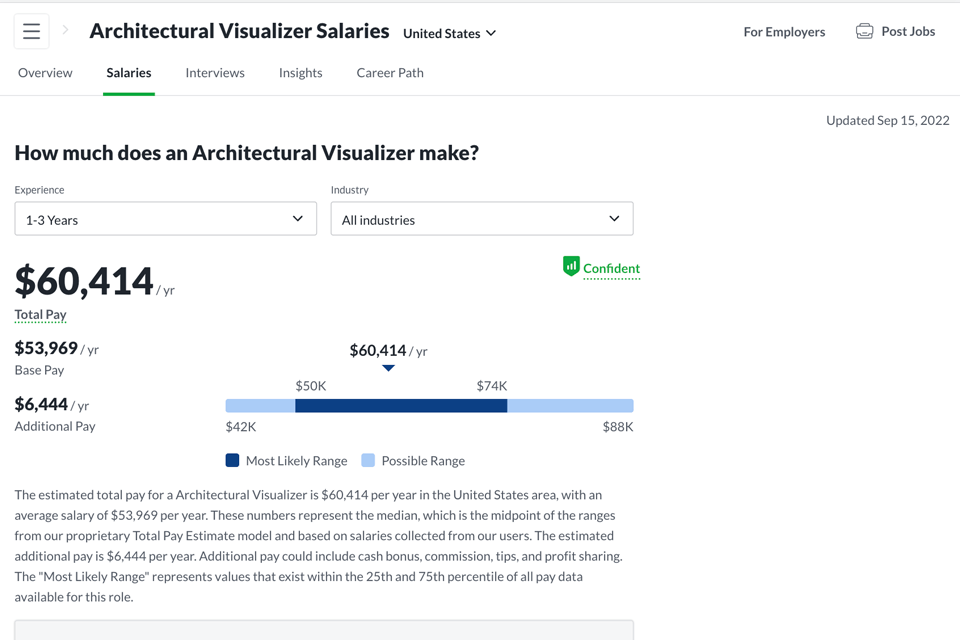
According to ZipRecruiter stats, architectural visualization professionals in the U.S. earn $68,971 a year on average. If you take a look at the cities with the highest salaries, you will see Barnstable Town, MA, with Sunnyvale, CA, and Santa Cruz, CA.
As per Glassdoor, specialists with 1-3 years of experience earn $60,000/yr on average. An architectural visualizer salary for professionals with 4-6 years of experience is $72,000/yr, while those who have more than 10 years of experience earn $75,000/yr.
It is highly unlikely that you will be hired for this position with such experience. If you don’t have much experience, you might need to apply for an internship first. In this case, you are likely to get a lower salary than on average in the industry as less than one year of experience hardly makes you a professional 3D architectural visualizer.
Yes, companies do not necessarily look only for professionals who have architectural backgrounds. However, if you don’t have such a background, it might be difficult for you to understand all the concepts quickly. Make sure to master the basics quickly and learn the jargon to make your work on architectural projects more efficient.
If you studied at an architecture school, it’s highly likely that you know something about CAD software. Without it, it might be impossible to pass an exam in 3D modeling. This is why you might need to take a look at other 3D programs and decide which of them can help you optimize your workflow. If you have never used any paid or open source CAD software, take a closer look at SketchUp as it has a lot of convenient tools.